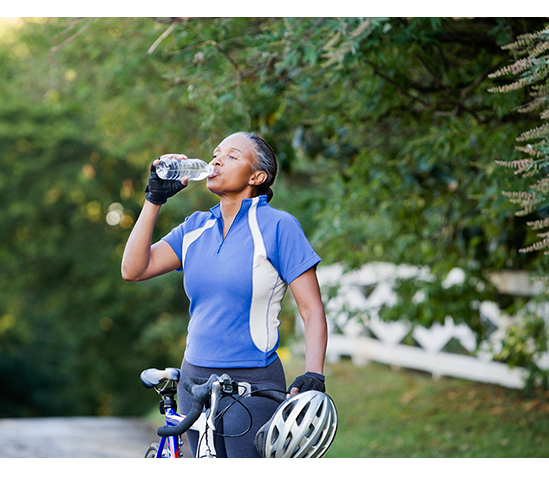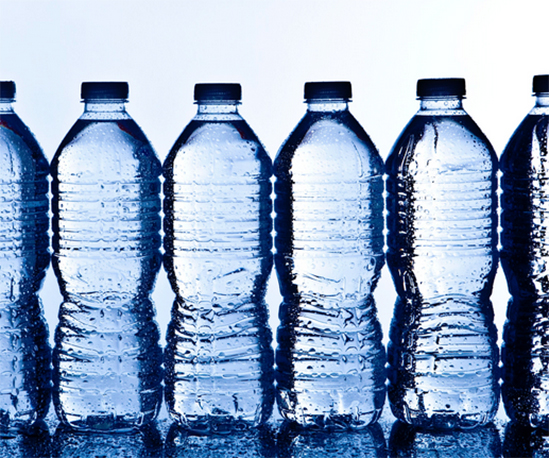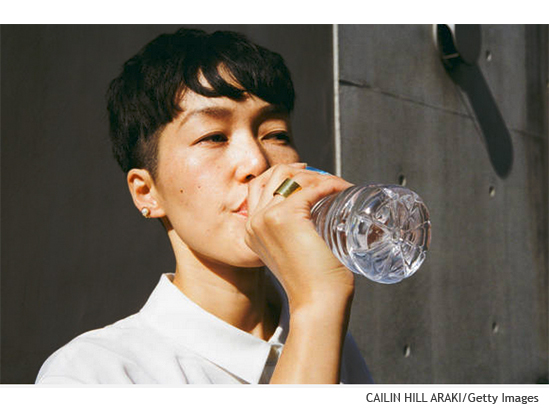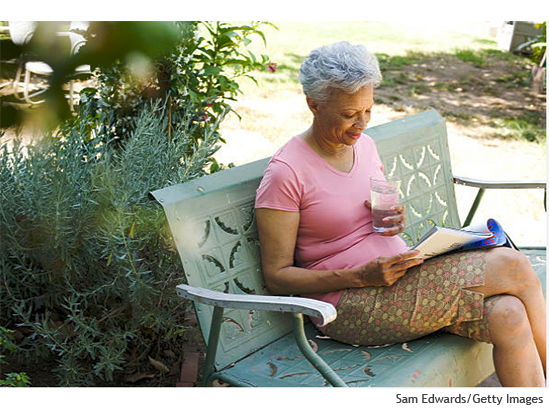Yesterday, some of my readers discussed rapper Yung Miami’s dangerous habit of not drinking any water. Apparently, other young women are following her lead and have stopped drinking water.
Not drinking water is a bad habit that can lead to dangerous consequences, including death.
Humans can go a month without eating solid food, but we can only survive about 3-5 days without drinking water.
The body is made up of 60% water. We lose 2.5% of water daily. Even a 2% loss of water above that amount can have devastating effects on our health.
How Much Water Do We Need Daily?

Expert opinion varies on the ideal amount of water intake. Doctors say we should drink 8 glasses (8 ounces in each glass) of water daily. But other experts say we need 13 or more glasses of water daily. The ideal amount depends on our age, body weight and health status. Some medical problems (such as heart problems or edema) require restricted water intake. Men require more water intake than women because men have more muscle mass.

Four 16 ounce bottles of water per day provides the daily recommended water intake for most people. Always consult with your doctor or healthcare provider if you are unsure of how much water to drink daily.
The following are 10 side effects of not drinking enough water.
1. Death
Death is the No. 1 side effect of not drinking enough water. The human body contains 60% water and the brain is 85% water. Water is the fuel of life. Without water, vital electrolyte levels in the body that are strictly controlled by the brain will become dangerously high or low. We need water to maintain our heart health. Water keeps the blood from thickening and causing blood clots or strokes. To put it simply, moderate to severe dehydration can cause a heart attack or stroke.
2. Chemical Imbalance

The brain maintains a strict control over the electrolytes and vitamins that maintain our heart and body processes. These processes include oxygenation of vital organs, waste disposal, bone and joint lubrication, etc. Water is a very important component in maintaining these crucial electrolytes that keep our body processes running smoothly. If the normal balance of electrolytes and vitamins are even slightly altered, it can cause devastating consequences and even death.
3. Weight Gain From Calorie Intake
Some people believe they will lose weight if they limit their water intake. But the opposite can sometimes happen. Your brain will cause you to increase your caloric intake when you’re actually dehydrated and need to drink more water. People who frequently snack on sugary and salty food may actually be thirsty from dehydration. The increased calories from all that snacking causes weight gain. Drinking more water will reduce the craving for sugar and salt.
4. Weight Gain From Water Retention
Some athletes and models don’t drink enough water before an event because they believe they will gain water weight. Actually the reverse happens. Dehydration causes the brain to conserve every drop of water by redirecting water to vital internal organs, causing water retention. If you don’t drink enough water you will urinate less because your body is retaining water.
5. Premature Aging

Have you noticed teenagers and 20-somethings who look older than their parents? Not consuming enough water daily will make you look old faster. Your skin needs water to maintain its elasticity and flexibility. Lack of water causes collagen to crack and split, causing premature age lines to form around your eyes and mouth. Your skin will look dull and weathered in your 30s and 40s, causing you to look a decade or more older than your stated age.
6. Hair Loss
Not drinking enough water daily can cause your hair to shed and break easily. Your skin (including your scalp) is the largest organ in your body. But the skin is the last organ to get water if dehydrated. Most people are in a constant state of mild dehydration. Their skin looks dry and ashy because water is constantly being rerouted from the skin to vital internal organs to maintain normal physiological processes.
Even in a state of mild dehydration, the body rations water to the organs that need it the most. The skin is last on the list and will only get a few drops of water. That’s why it’s important to drink at least 8 glasses of water per day to ensure that the skin will always get the water it needs. To put it simply, if you’re constantly applying lotion to your ashy skin, you’re not drinking enough water. Your hair and nails will be dry, brittle and break easily.
7. Poor Muscle Mass
The body is made up of 60% water and most of that is in the muscles, so not drinking enough water causes muscles to go soft. Dehydration reduces the muscle mass and causes muscles to become more sore and painful after exercise. If you exercise regularly you should drink lots of water. Always follow your doctor or trainer’s advice on water consumption while training.
8. Stomach Ulcers
People who don’t drink enough water are prone to stomach ulcers. A stomach ulcer is an open sore in the stomach lining that is usually caused by too much acid in the stomach. Drinking water regularly helps to reduce the stomach acid that can cause heartburn.
9. Body Temperature
Drinking water helps to control our body temperature and keeps internal organs cool on hot days. Not drinking enough water can cause heat cramps (severe pain in hands, legs and feet). Dehydration can also cause dizziness, weakness, malaise and fatigue, headaches, and rapid pulse. In severe cases, people can experience heat stroke, which can be life-threatening.
10. Constipation
When the body is in a mild to moderate state of dehydration, water will be rerouted to vital organs. That process occurs in the bowels by pulling water away from the stool and into the bloodstream. The more water is pulled away, the harder the stool becomes until it is difficult to pass stool. Drinking 2 tall glasses of water will immediately relieve constipation in most cases when constipation is not caused by a medical problem.
This has been your Medical Minute.
DISCLAIMER
Any medical information published on this blog is for your general information only and is not intended as a substitute for informed medical advice. You should not take any action before consulting with your personal physician or a health care provider. Sandrarose.com and its affiliates cannot be held liable for any damages incurred by following information found on this blog.
Photo by Rich Fury/Getty Images, Ariel Skelley/Getty Images






